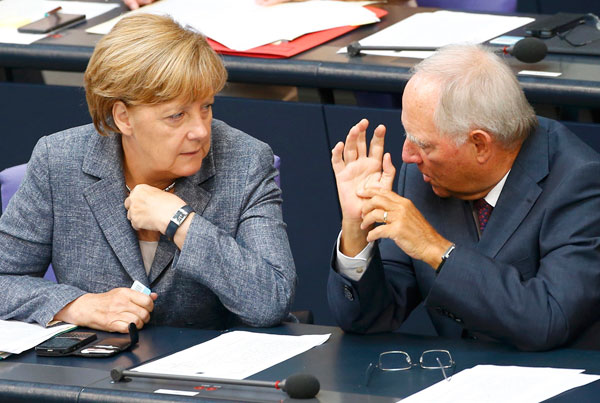German lawmakers back third Greek bailout
(Agencies) Updated: 2015-08-19 19:07
 |
|
German Chancellor Angela Merkel talks with Finance Minister Wolfgang Schaeuble prior to a vote on Greece's third bailout programme during a session of Germany's parliament, the Bundestag, in Berlin, Germany, Aug 19, 2015.[Photo/Agencies] |
BERLIN - German lawmakers overwhelmingly voted in favor of a third Greek bailout on Wednesday, heeding a call from Finance Minister Wolfgang Schaeuble to give Greece the chance for a new start.
There was a sizeable rebellion in Chancellor Angela Merkel's own party ranks, however, suggesting she cannot return to parliament to seek aid for Athens again.
The Bundestag lower house of parliament, whose backing is essential for the release of bailout funds, approved the plan by 454 votes to 113, with 18 abstentions.
A breakdown of which lawmakers voted 'no' was not immediately available.
Popular misgivings about sending more aid to Athens run deep in Germany, the euro zone country which has already contributed most to Greece's two previous bailouts since 2010. The new package is worth 86 billion euros ($94.94 billion).
Schaeuble, Germany's toughest negotiator on the Greek bailout, led calls for a 'yes' vote in the parliamentary debate.
"Of course, after the experience of the last years and months there is no guarantee that everything will work and it is permissible to have doubts," said Schaeuble.
"But in view of the fact that the Greek parliament has already passed a large part of the measures it would be irresponsible to not use the opportunity for a new start in Greece," he said, making the case for the government.
Schaeuble had taken a tougher line than Merkel in bailout talks. Last month, he tabled the option of a 'timeout' from the euro zone for Greece, before then throwing his weight behind the new bailout plan.
Support from parties including the Social Democrats (SPD), Merkel's junior coalition partner, and the opposition Greens ensured German approval of the bailout.
But in a blow to Merkel's authority, dozens of conservatives vowed to oppose the bailout before the vote.
"The problem isn't a lack of European solidarity but a lack of Greek efficiency," said Wolfgang Bosbach, a member of Merkel's conservative Christian Democrats (CDU).






